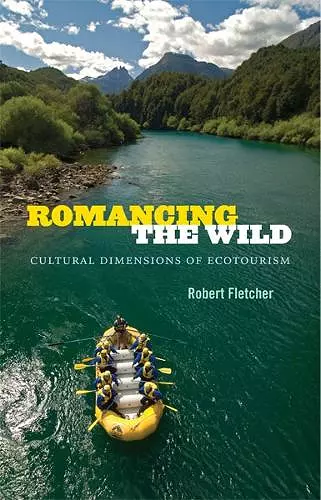Romancing the Wild
Cultural Dimensions of Ecotourism
Format:Paperback
Publisher:Duke University Press
Published:12th Mar '14
Currently unavailable, and unfortunately no date known when it will be back

The worldwide development of ecotourism—including adventures such as mountain climbing and whitewater rafting, as well as more pedestrian pursuits such as birdwatching—has been extensively studied, but until now little attention has been paid to why vacationers choose to take part in what are often physically and emotionally strenuous endeavors. Drawing on ethnographic research and his own experiences working as an ecotour guide throughout the United States and Latin America, Robert Fletcher argues that participation in rigorous outdoor activities resonates with the particular cultural values of the white, upper-middle-class Westerners who are the majority of ecotourists. Navigating 13,000-foot mountain peaks or treacherous river rapids demands deferral of gratification, perseverance through suffering, and a willingness to assume risks in pursuit of continuous progress. In this way, characteristics originally cultivated for professional success have been transferred to the leisure realm at a moment when traditional avenues for achievement in the public sphere seem largely exhausted. At the same time, ecotourism provides a temporary escape from the ostensible ills of modern society by offering a transcendent "wilderness" experience that contrasts with the indoor, sedentary, mental labor characteristically performed by white-collar workers.
“Fletcher forensically analyses what it is about getting active in the great outdoors that chimes with the culture of its majority attendees – white middle class westerners.” * Wanderlust *
"Robert Fletcher, an accomplished white-water tour guide, ecotourist, and cultural anthropologist, emerges in this text as one of the rare few whopossesses the skill set needed to gain ethnographic entree into this elusive, fast-moving subculture." -- Sally Ann Ness * Current Anthropology *
“Although the main topic in this substantially researched title is why people engage in ecotourism, the practical implications of this study are important. . . . The book has serious implications for those who would promote ecotourism as a primary means of saving endangered landscapes, saying it may not be the panacea we had hoped. VERDICT Recommended for academic libraries.” * Library Journal *
“Fletcher offers readers a serious review of ecotourism and its evolution over the past several decades…. Altogether, there are few aspects of the human condition as it interacts with nature that the author does not touch on, from politics to psychology to sexuality and literature (Was Don Quixote the original ecotourist?). Any reader looking for a deep understanding of ecotourism should start here.” * Booklist *
"This book makes an important contribution to tourism studies. Further, by situating the ecotourist as the quintessential postmodern subject, Fletcher offers an analysis that will be of interest to a much broader audience, linking contemporary work to leisure and contemporary production to consumption." -- Laurie Kroshus Medina * American Ethnologist *
"In Romancing the Wild, Fletcher ... generally describes the contemporary ecotourist scouring the globe for the next adventure. Because anthropology is famous for getting at the humanity behind the data, works such as Romancing the Wild are particularly important." -- Frank Hutchins * American Anthropologist *
"[A] comprehensive and well-written discussion of the ways in which adventure seeking activities like whitewater kayaking, mountaineering, and so on, can be used to think about how and why certain kinds of dominant cultural values, norms, and discourses – such as individual autonomy, self-actualization, continual progress, and class privilege – are formulated, communicated, and experienced in identity-shaping ways." -- Luis Vivanco * Journal of the Royal Anthropological Institute *
ISBN: 9780822356004
Dimensions: unknown
Weight: 358g
264 pages